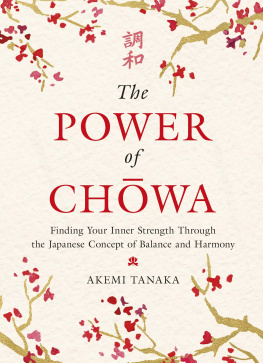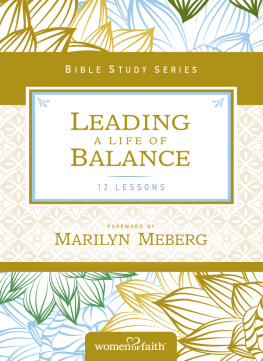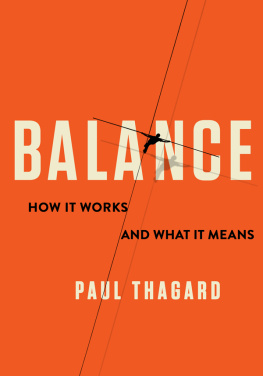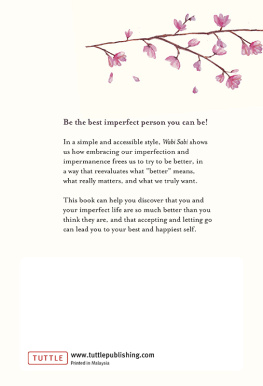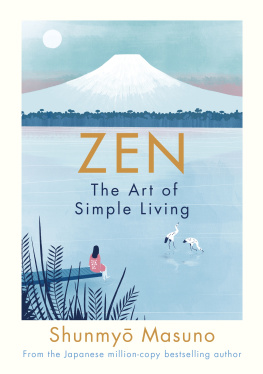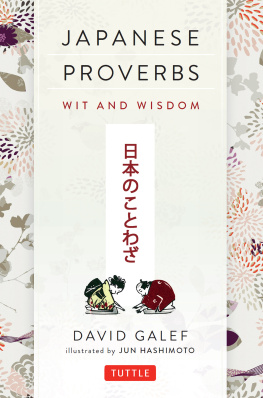To Rimika and Richard
Contents
How to practice small daily acts to achieve natural harmony in the home
How to find our balance as we manage our family roles and responsibilities
How to keep track of our spending and reward ourselves (and others) with the money we save
How to adapt our personal style for any time, place, or occasion
How to manage our emotions to improve our relationships with everyone (including ourselves)
How to apply our learning, learn from experience, and put our knowledge into practice
How to forge harmonious partnerships and achieve real change in the workplace
How we can bring about positive changes in the world
How eating the Japanese way can help bring balance to our diets, pave the way for a long and healthy life, and allow us to eat more sustainably
How we can become more in tune with nature, better understand our place within it, and tackle climate change
How to forge a stronger, more loving relationship
What the ancient art of the tea ceremony can teach us about death, disaster, and moving on
Dear reader,
My name is Akemi Tanaka, and in this book Id like to share with you a traditional Japanese approach to finding your balance: chwa.
My name, Akemi, means bright and beautiful. Tanaka, my family name, means in the middle of the rice fields, which is fitting as I was born in rural Saitama, part of the now vanished province of Musashi, in a small country town on the outskirts of Tokyo. My family are the proud descendants of high-ranking fifteenth-century samurai who fought alongside the warrior-poet ta Dkan, the architect of old Edo Castle, now part of the Tokyo Imperial Palace.
After a traditional upbringing, I studied Western etiquette at a finishing school in Tokyo before studying at university in Saitama. It was an exceedingly busy timeI was studying English literature and training to be a teacher, and in the evenings working at a Ginza cinema in the bustling capital. There I met my first husband, a young doctor from Japanese high society. I mixed with diplomats, company presidents, and members of the Imperial Family. I was schooled in the art of the tea ceremony and was fascinated by the formal codes of Japans elite circles. It was a great adventure, like My Fair Lady.
I had my doubts about married life. I found myself doing all the little things that have served to keep women out of public life for generationscooking, cleaning, repairing clothes. I also found myself thinking how I might find the courage to change things for both me and my baby daughter, but in the end, change took me by surprise. My husband and I separated. The divorce left me a social outcast. Divorce was rare and single-parent families were almost unheard of in 1980s Japan. I felt completely taken aback, unable to decide on a course of action or deal with this sudden reversal of fortune.
At this time, I first felt an idea coming into focus. It was a way of thinking I had unconsciously practiced throughout my childhood. It involved being attentive to the balance of my own mind (what was going on with me) and the special balance of a room (what was going on with other people). It stayed with me even when I moved across the world to make a new life in England. This way of thinking, like a sword that had slept at my side but was ready when I needed to wield it, was the wisdom of chwa.
In Japanese, chwa is usually translated simply as harmony. The Japanese characters in this word literally mean the search for balance. Chwa offers problem-solving methods that help us to balance the opposing forces life so often throws at us: at home, at work, in our education, and in our personal relationships.
I started to teach others about chwa. I gave lessons to private students in my own home and then to larger groups, to high school and university students. I started accepting invitations to speak on television and radio. The more I taught, the more I felt that the ideas, techniques, and ways of thinking that helped me could be distilled in this concept of chwa. I was convinced that chwa could also help others find their balance.
Chwa is not a mysterious Japanese quality; rather, it is a philosophy, a set of practices that can change our way of thinking about ourselves and others. Its a way of thinking about the world that can be taughtand learned. While learning this age-old concept requires conscious, mindful effort, chwa can teach us practical ways to approach everyday challenges: how to keep our homes clean and tidy, how to achieve a good work-life balance, how to find a love that lasts. Chwa teaches us how to handle other challenges too: how to deal with death and disaster, how to act with the courage of our convictions, how to help others.
Today, I live in London. I have appeared on the BBC and on Channel 4, and have been featured in the Guardian and Daily Telegraph speaking about issues relating to Japan. I have given lectures at Oxford and Cambridge universities and at the Victoria and Albert Museum in London. I was given a Points of Light award in recognition of the work of my charity Aid For Japanwhich I founded after the 2011 tsunami to support orphans of the disasterby the former Prime Minister of Great Britain, Theresa May.
I hope you will find some of the lessons in this book as useful as I have. While I might once have taken them for granted, the more Ive shared and taught about my culture, the more extraordinary I have found the lessons I am about to share with you.
Akemi Tanaka
Please visit my website:
akemitanaka.co.uk
Follow me on social media:
Twitter: @akemitanaka777
Instagram: @akemitanaka777
Facebook: facebook.com/powerofchowa
Two pilgrims find themselves walking down a long road. One of the pilgrims is wearing a wide-brimmed straw hat. The other is not. It is a scorching day. The sound of the cicadas is deafening. Neither of the pilgrims says a word to one another. They walk slightly apart, giving each other space for their own thoughts. After a few minutes of keeping one another company, the pilgrim wearing the straw hat takes it off and ties it to his pack. They keep walking, side by side.
Inspired by Bushid, Nitobe (1908)
What is chwa?
I have always thought that the English word harmony had a slightly false ring to it. For me, it calls to mind beaming smiles and 1970s flower power slogans, dusty porcelain angels on the mantelpiece of an elderly relative, or the beauty pageant contestant who says she prays every night for world peace. From religion to relationships, it makes me think of an illusory, heavenly idealnot something that many of us aspire to achieve in this world.
The Japanese word chwa, by contrast, although it can be translated as harmony, is about something far more practical. It is a way of life. It is something that you can actively do. It would be more accurate to translate chwa not as harmony but as something more like the pursuit of harmony or the search for balance.
In Japanese, chwa is written like this:
ch-wa
The first character, ch, means search.
The second character, wa, means balance.
Ch is a simple character, but it has many layers. Ch can be used in a literal sense, such as in the verb to search when one is rifling through drawers, and in a metaphorical sense, when one is racking ones brains searching for an answer or for inspiration. The character can be used in another verb: to prepare. Here, it means finding order or being ready for an upcoming challenge. Finally, like harmony,
Next page
